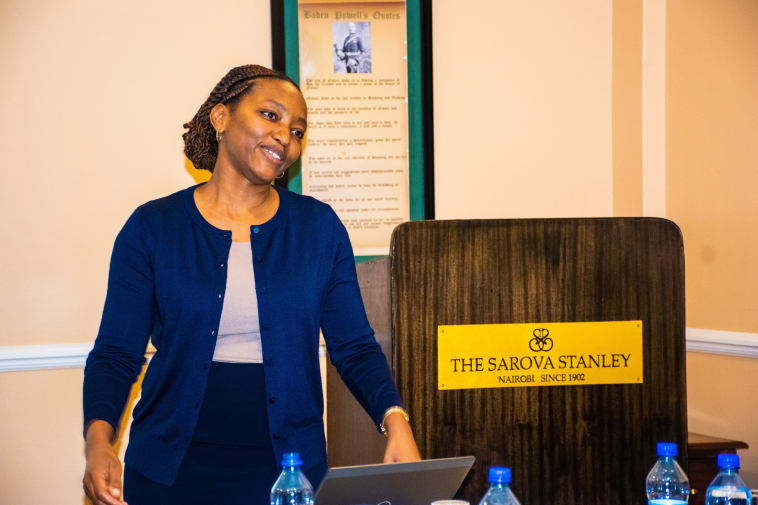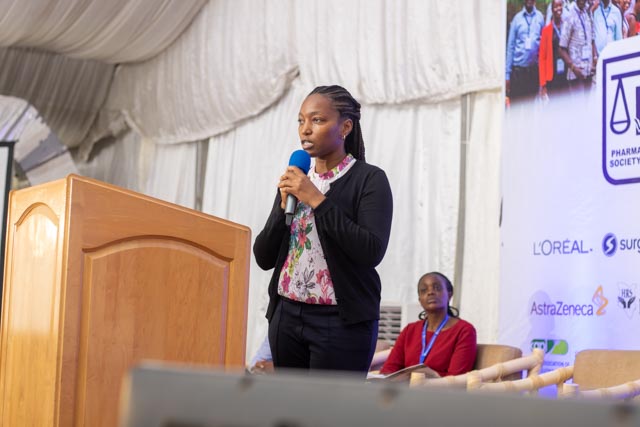Dr Ruth Wamae shares her experiences preventing postpartum haemorrhage in Kenya

Dr Ruth Wamae is Project Manager for the Accelerating Measurable Progress and Leveraging Investments for Postpartum Haemorrhage Impact (AMPLI-PPHI) initiative at the Kenya Obstetrical and Gynaecological Society (KOGS). She shares her professional experiences responding to PPH and highlights the importance of collaboration to prevent the maternal deaths and disabilities caused by it.
What has made you passionate about contributing to the elimination of PPH in Kenya?
I am passionate about contributing to the elimination of postpartum haemorrhage due to my experiences as a young doctor. When I was an intern, we lost a mother to PPH. When I look back on that experience, I think about how horrific it was for everyone involved – the loss of her life, the family left without a mother, and the death of a patient for the maternity team who had been managing her.
Experiences such as this one made me realise that if we had better knowledge to save mothers and their babies, women would be able to come into a maternity ward without fear. The same goes for health care workers: when we start the shift, we're always afraid that a mother could die.
Knowing that there are solutions out there that allow us to safely deliver babies and give mothers the ability to enjoy motherhood happily gives me hope. Our response must be to do everything we can to give women a positive experience during pregnancy, childbirth and motherhood.
What is your perspective on the importance of collaboration for the prevention of PPH?
My personal experience of working in a maternity ward is that you cannot do anything alone. Delivering quality maternal care requires teamwork from the most senior consultants to the youngest members of the team. All health workers, from the obstetricians and midwives to clinical staff and hospital management, need to cooperate to deliver quality care for women and improve maternal and neonatal outcomes
So, when I came into advocacy work, I looked at it in terms of bringing together everyone who is involved in the management of mothers, as they should all be trained in the management of PPH. While everyone may come from different backgrounds and work differently, we all need to understand what PPH is and what should be done so that everyone can prioritise it in their practice and be able to support in case of emergencies.

Is there a role for community leaders outside of the clinical sphere in contributing to the fight against postpartum haemorrhage?
For sure, because sometimes doctors and midwives will be doing a lot of work in health facilities, but you also need to engage the community to educate people on important aspects of preventing PPH. You need to have your advocates living in the community. These advocates can raise awareness among political leaders and call for more financing and prioritisation of PPH as a public health issue.
Again, it's about working with everyone so that we can prioritise PPH, otherwise it gets lost among all the other health needs of the country and leads to more loss of women. I feel like in health care, if you are not able to deliver quality maternal care, then you cannot achieve much, you cannot be successful in all other aspects of healthcare as it is such a core issue.
We shouldn't get tired of reinforcing the message to everyone, wherever we are, whether you are an advocate or a health worker. Statistics have improved in certain areas, but sometimes we have certain challenges like COVID-19 which take the community back in terms of key indicators of maternal health. Whichever place you are in, try and make any contribution you can make to prevent a maternal death.
About the AMPLI-PPHI project
FIGO is working as part of a consortium on the AMPLI-PPHI project, led by JHPIEGO and in partnership with PATH. Together, we support Ministries of Health to ensure that the right PPH drugs are available at the right time, in the right place, for the right indication and for the right patient across health systems, ultimately saving the lives of thousands of mothers and newborns.
We work though our member societies in Democratic Republic of Congo, Guinea, India and Kenya and engage with an additional 13 member societies, as well as States in India, to share the learning, knowledge and best practices to support on-going PPH efforts.